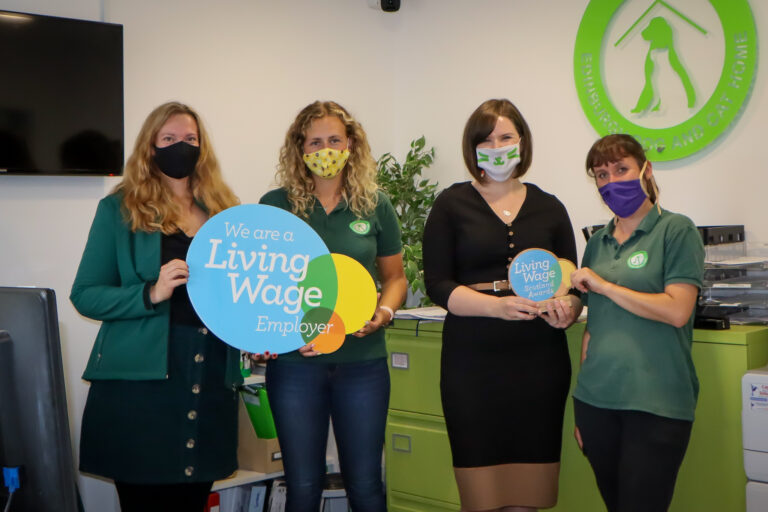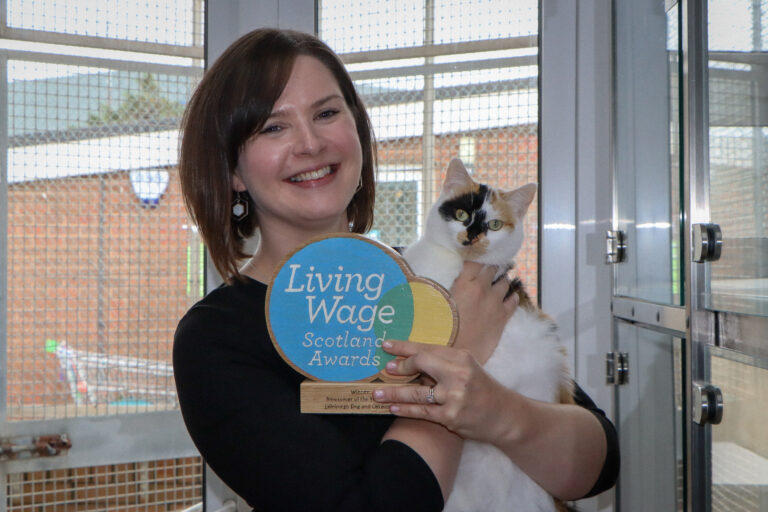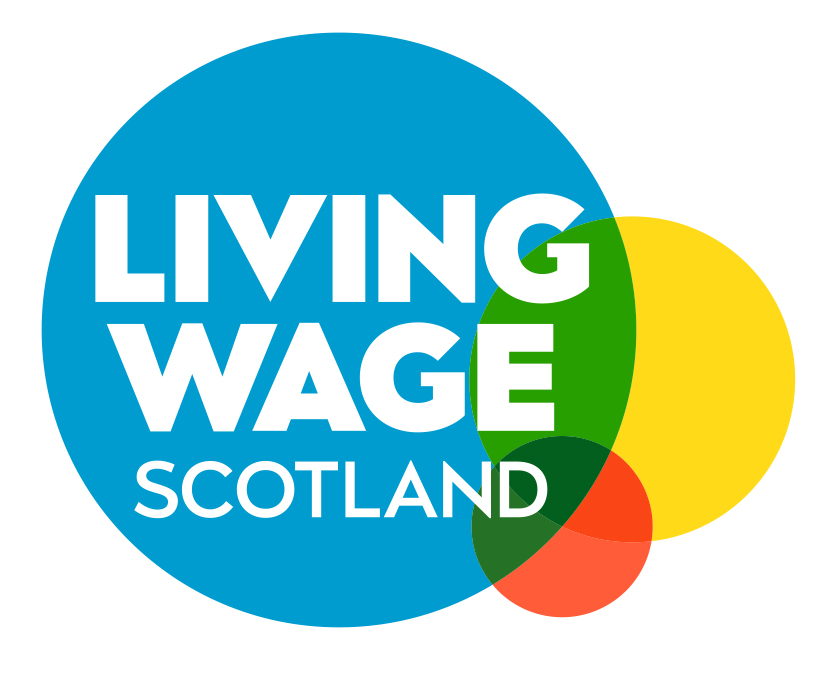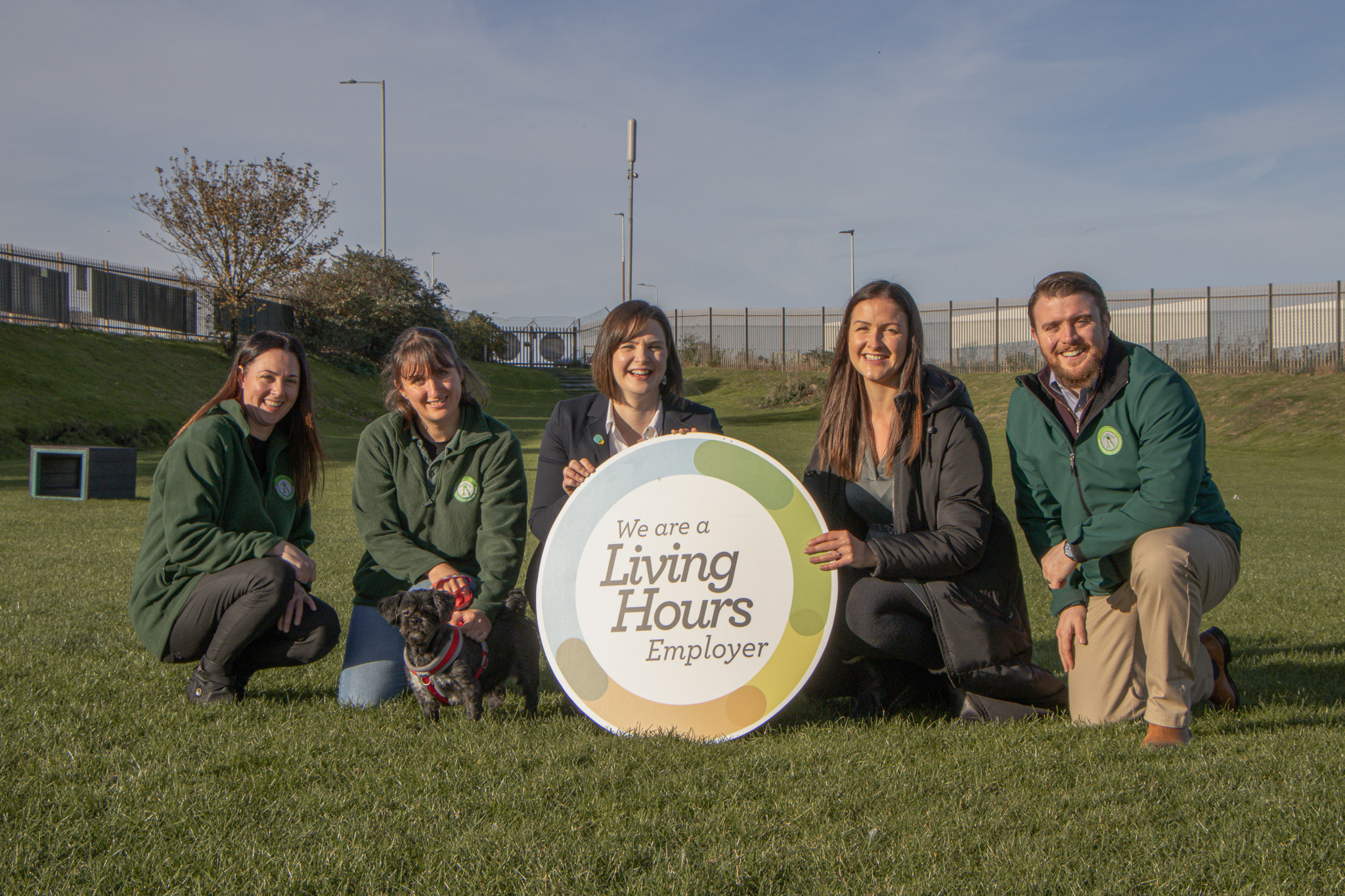Edinburgh Dog and Cat Home (EDCH) has been carrying out its mission to rescue, reunite and rehome stray, lost and abandoned dogs and cats across Edinburgh and the Lothians for almost 140 years. EDCH also supports the local community through its pet food bank and education outreach programme. EDCH became Living Wage accredited in 2019 and Living Hours accredited in 2021.
The Motivation

The animal welfare sector is often described as a ‘career of passion and calling’ and front-line staff are commonly low-paid rather than financially rewarded for their hard work. The Senior Management Team and Board of Trustees at EDCH have long voiced the need for change within the sector, with the aim of challenging this misconception. It was for this reason that they decided to adopt the real Living Wage and Living Hours measures. By taking this step, they hope to encourage others in the sector to recognise the knowledge, dedication, and experience that is required to work with animals – particularly in a rescue centre environment where animals can come with a variety of challenges.
“We are the first animal welfare organisation in Scotland to embrace this important change and we’re extremely proud to be seen as industry leaders and trend setters as small and local as we are.”
Lindsay Fyffe-Jardine, CEO
In 2017 and 2018 it was calculated that EDCH had lost tens of thousands of pounds in absence costs, which doesn’t include the measurement of productivity loss. EDCH examined the reasons cited for both long- and short-term absence and it was clear from the data that stress, and inadequate rest time was causing issues for the team and their wellbeing. EDCH recognised that addressing this problem would start with gathering data on the staff work experience and using this to make changes and introduce a new business plan.
“The real Living Wage represents the empowerment and betterment of staff in a world where inequalities continue to grow. It’s the right time to acknowledge that valuing staff should not only be set in organisational statements but also in organisational action.”
Lindsay Fyffe-Jardine, CEO
The Process
With the health and wellbeing of all employees at the heart of their thinking, EDCH began by engaging with NHS Healthy Working Lives and carried out an employee survey with ACAS to determine how they could best use their resources to provide support to staff. This consultation process was carried out through several different face-to-face and written communication channels, aiming to be as transparent as possible and encourage employees to be involved. The Senior Management Team felt that using a variety of communication channels would be the best way for open and honest feedback.
The responses to the survey clarified the issues EDCH had been experiencing. Examined alongside staff retention and absence data, they showed:
- Poor long-term retention of experienced staff
- Challenges with staff sickness impacting both performance and team morale
- Shift patterns, frequency of rest days, and in-work poverty caused by low pay were having a detrimental impact on both the team and the organisation
The quantitative data presented by a stress audit highlighted the drivers of the issues facing staff, and allowed them to share their perspectives. A full cost recovery approach was used, examining the levels of sickness rates and productivity and financial costs to the business of both short-term, disruption sporadic absence and long-term staff sickness.
EDCH identified that tackling low pay and changing the approach to working hours was imperative to supporting overall staff wellbeing. This pointed strongly towards the Living Wage and Living Hours as key solutions within a new business plan.
The results of the consultation led EDCH to look at improvements in several areas including:
- Introducing the real Living Wage to all staff
- A commitment to have no zero-hours contracts
- Changing working patterns to ensure a better work life balance
The first step towards Living Wage accreditation began with a new business plan. This was used to identify all the factors and costs which would be involved in undertaking their ambition to pay the real Living Wage alongside other improvements the management team wished to implement.
EDCH designed and implemented a wellbeing strategy from these findings called ‘Happy People, Happy Animals’, which focused on key elements of the staff’s wellbeing and resulting morale. While the quality of care of the animals was gold standard, it was acknowledged that this had to be reflected in the care and leadership of the entire team. Once the areas for improvement were identified, the team worked hard to implement the changes quickly so that employees could start to experience the benefits of these as soon as possible.
The decision to implement the real Living Wage led to more than half of EDCH’s employees receiving a wage increase to the real Living Wage. This made a real impact on employees and worked to help address any money worries their team were experiencing.
As well as introducing the real Living Wage in 2018, Edinburgh Dog and Cat Home also converted all zero-hours contracts to fixed hour contracts to reflect the hours staff were working. Following on from this, a new rota system was also implemented to ensure staff were given their shifts as far as 12 months in advance.
These changes meant staff could better plan their life around work. Shifts that were not fixed were changed. This was important for the kennel and cattery team who previously had ad hoc shifts on Sundays which often did not finish on time. Now they have fixed rosters excluding Christmas and New Year which staff rotate.
When Living Hours accreditation was introduced in Scotland, the changes that Edinburgh Dog and Cat Home had made meant they were in an ideal position to consider and apply for Living Hours recognition.
The Living Hours programme requires employers to both pay a real Living Wage and commit to provide at least four weeks’ notice for every shift, with guaranteed payment if shifts are cancelled within this notice period. Living Hours employers also provide a guaranteed minimum of 16 working hours every week (unless the worker requests otherwise), and a contract that accurately reflects hours worked.
In order to gain Living Hours accreditation, EDCH spoke with staff members who requested to be on less than 16 hours due to study or their family life. These employees were asked to sign an opt-out form as part of the Living Hours accreditation process.
The changes which enabled EDCH to apply for both Living Wage accreditation in 2019 and Living Hours accreditation in 2021 were not the only changes made within the organisation.
Mental health and compassion fatigue are also serious issues within the animal care sector and staff can often experience burn out from the challenging and emotional situations which they are faced with. To tackle this, EDCH created a new chill out area called ‘Paws and Chill’ which staff can access if they need some time to relax and process the daily challenges of their work.
Benefits
Since implementing these measures and becoming a Living Wage and Living Hours accredited employer, Edinburgh Dog and Cat Home have reported a tidal wave of positivity and engagement from their team. Staff members advise they feel more valued, and this has had a positive impact on their morale and productivity. The sense of pride that comes from the decision to implement the real Living Wage has been immeasurable for the Senior Management Team.
“A lot of work in animal care is on minimum wage but it’s really hard work, both physically and emotionally, so being paid the real Living Wage shows how much Edinburgh Dog and Cat Home appreciates us. I think everybody feels more valued. I was always proud to work here but this was an extra boost for everyone.”
Carla Tait, Dog First Aid Trainer
As well as seeing increased morale and positivity from staff, EDCH has also seen several more tangible benefits:
- Staff absence rates have decreased from 8-9% to only 1-2%
- Improved retention rate across staff but especially amongst high performing employees who were leaving due to not being appropriately rewarded
- Applications for kennel assistant roles have quadrupled
- Improvement in the quality of applicants
- Many employees now feel they can build a long-term career working at EDCH
Wendy Mullen has worked for Edinburgh Dog and Cat Home for 35 years, and explained that while she has seen a lot of change in her time with the Home, the adoption of the real Living Wage is the most positive change she has seen.
“Staff well-being has improved, and this has had a big impact on team morale and productivity. Although making the decision to commit to the real Living Wage costs the business more money, it’s enabled us to keep high performing staff members, and this has saved us in recruitment and induction costs.”
Wendy Mullen, Kennel Manager
Following the implementation of the real Living Wage and new rota pattern the stress audit was repeated and the results showed both staff working hours and equality of pay as being of low risk to the organisation now. As well as enjoying their new chill out space, staff also believe that being paid the real Living Wage can contribute to better mental health and a sense of well-being.
“At first I was planning on putting the extra money aside for my wedding or towards fuel for the car but in reality, I’ve found that I spent it more on socialising and treating myself which I think has had a big impact on my mental well-being.”
Carla Tait, Dog First Aid Trainer
Learning and Advice
EDCH’s Living Wage commitment formed part of their wider well-being strategy which launched at the same time. Through making considered changes to other areas of the organisation as well as adopting the real Living Wage, Edinburgh Dog and Cat Home have ensured that they experience as much benefit as possible from their investment in paying the real Living Wage.
“We are very proud to be leaders in this movement within the Scottish animal welfare sector and to contribute to moving the sector forward to recognising the skill, professionalism and expertise that is required to work with animals – particularly rescue animals. We believe that if people are your greatest asset, then looking after them, helping them to become more successful and feel more valued will show not only within your staff culture but also your productivity.”
Jamie Simpson, Director of Operations
For the team at Edinburgh Dog and Cat Home, becoming an accredited Living Wage and Living Hours employer provides clear recognition of the organisation’s ethical focus and allows them to demonstrate leadership within a challenging industry.
Reflecting on the full cost recovery work carried out in 2019, EDCH’s CEO Lindsey Fyffe-Jardine stated that the rational business case was a driver to EDCH becoming accredited, above and beyond the belief that it was the right thing to do The cost of implementing the real Living Wage was less than what EDCH were spending on sick pay. Lindsey recommends that combining the real Living Wage with the development of a well-being strategy and culture will garner a wider change across organisations pursuing accreditation.
“For me this isn’t just about everyone being part of a positive culture of wellbeing but also being part of a culture of high performance with quality outcomes for our mission. Fundamental to delivering that is our people”
Lindsay Fyffe-Jardine
 Edinburgh Dog and Cat Home have become champions of both the real Living Wage and Living Hours. Since becoming the first animal welfare organsation in Scotland to be awarded Living Wage accreditation in April 2019, EDCH have gone on to win the Newcomer of the Year Award at the 2019 Living Wage Scotland Awards. Eight months after becoming a Living Hours accredited employer in November 2021, EDCH won the Living Hours Champion Award in July 2022.
Edinburgh Dog and Cat Home have become champions of both the real Living Wage and Living Hours. Since becoming the first animal welfare organsation in Scotland to be awarded Living Wage accreditation in April 2019, EDCH have gone on to win the Newcomer of the Year Award at the 2019 Living Wage Scotland Awards. Eight months after becoming a Living Hours accredited employer in November 2021, EDCH won the Living Hours Champion Award in July 2022.
Lindsay Fyffe-Jardine represents EDCH on the Edinburgh Living Wage Action Group. The Action Group have committed to doubling the number of Living Wage accredited employers in Edinburgh over the next few years.
EDCH continue to speak at events promoting the real Living Wage and Living Hours across Scotland and the UK.
Download a pdf version of Edinburgh Dog and Cat Home’s profile here


